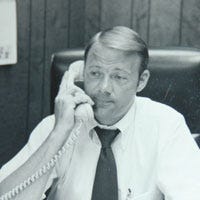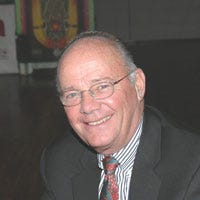The long view: 40 years of custom molding
In 1969, a 32-year-old Ken Groff saw an opportunity to launch a business in a rejected part program. Forty years later, the original Franzus Clothes Steamer is no longer around, but the company Groff founded, Venture Plastics, definitely is.
March 3, 2010
In 1969, a 32-year-old Ken Groff saw an opportunity to launch a business in a rejected part program. Forty years later, the original Franzus Clothes Steamer is no longer around, but the company Groff founded, Venture Plastics, definitely is.
Working in sales at a Middlefield, OH injection molder, Ken Groff watched as that company turned down the opportunity to supply tooling, parts, assembly, and shipping for the clothes steamer. Showing initiative where management displayed disinterest, Groff and two fellow employees created Venture Plastics, with the clothes steamer as their first program. The business was incorporated on Oct. 21, 1969 in Warren, OH. Four years later, Groff bought out his partners and moved the company to Newton Falls, OH, where its headquarters still stand.
|
|
Marking 40 years in custom molding in 2009, Venture Plastics founder Ken Groff founded his business at 32 and remains involved today at 72. |
In the intervening years, Venture Plastics has seen many brick-and-mortar changes, undergoing expansions in '77, '86, and '95 so that its Ohio location now covers 45,000 ft2. In 2006, Venture invested $2 million in a new 48,000-ft2 facility in El Paso, TX called Southwest Venture Plastics. But as much as some elements of the business and the environment it operates in have changed, Groff says that as Venture enters its fourth decade-and he his seventh-many other things remain the same.
"This philosophy got us 40 years so I don't know why we'd change it too much," he says. "We might tweak it a little bit but-diversification, treating employees correctly-I don't see why we can't go forward."
An early start
Groff's introduction to plastics came at Geauga Industries, where his father worked in sales, and he started in the estimating department before being promoted to cost-reduction specialist in 1967. In this role, Groff found the most fulfilling aspect of his work came in studying how projects he had estimated ultimately played out. This attention to detail and start-to-finish project management continues at Venture to this day.
One thing that has changed, and been key to the company's success, according to its leader, is a move toward customer diversification. Although Venture launched with one primary product and customer, when that product faced liability issues for failures in the field, Groff appreciated the value in spreading his company's exposure across multiple markets.
Today, Venture serves segments as diverse as appliances and industrial products. "One of the problems [Venture] encountered early on was not having the diversity that's so important," explains Steve Trapp, Venture president, "and it's why we try to maintain it today."
Maintaining growth
In the midst of the worst recession since the great depression, Trapp estimates that Venture Plastics' sales will finish 2009 7% ahead of 2008, with growth of 15%-20% forecast for 2010. As the year came to a close, Venture added four injection molding machines and a production manager, with three of the machines headed to Ohio and one press, as well as the new hire, installed in Texas.
"This has been an unusual year with the recession," Trapp says, "but despite that, we've seen a lot of opportunities that have developed at both plants." Trapp said October would likely be a record month for new tooling, and those molds are in addition to transfer tooling won by Venture.
Two decisions helped ensure that Venture's 40th year would be one of growth to help it through the downturn: a little TLC for existing customers and a willingness to open its books for new ones.
"First and foremost, we've had a strategy to focus on our key accounts," Trapp says. "We have 10 or so that have been with us for many, many years and part of our strategy is making sure we're servicing them to the Nth degree and looking ahead and trying to understand what they want two, three, four, five years out."
The company's flexibility and fiscal health have also helped it win new business. "This economy we're in, we've found a number of market segments have molders that just aren't able to survive," Trapp says, "so we've been opportunists in jumping on some of those programs. A lot of customers were concerned about their suppliers, and we were not embarrassed to send our P&Ls [profit and loss statements] to them."
"[Our customers] make more demands, but it's been good for us," Groff says. "We answer those demands and then we can handle the other customers more easily because we have this technology and these systems. A lot of the customers will say, 'The less we hear about you and see you, the more we like you.'"
Don't be afraid to get out of the way
In addition to taking care of its customers, Groff says the biggest reason it's conducted business under eight different U.S. presidents has been an emphasis on its employees, some of whom have worked with Groff for 35 years. "We treat [our employees] with respect and we make them part of the team," Groff says. "We involve our people, which is, I think, a key thing. You don't just go out and throw it at them and expect them to react. They're part of the decision, so we try to make them a big part of the team."
More than 40 years in plastics have given Groff perspective and insight into nearly every issue Venture faces, but that doesn't mean he interjects in all of them. "We've grown and as we've grown, we've stayed with the core principles, and then I get out of the way-I don't micromanage," Groff says. "I let my people do their jobs. There are a lot of different ways of getting from point A to point B. I have my way and they have theirs and as long as you come out ahead at the end, it's OK."
Web exclusive: Lessons from Ken Groff
Lesson One: Never, ever, ever, be satisfied with where you are and what you have achieved.
The root of conducting good business is never being satisfied that good is good enough. Each and every step of the way needs to be analyzed, reanalyzed, and modified accordingly. Activities that cannot be measured—or are not measured—tend to be activities that get a company in trouble. Conversely, even the most successful project usually can be made even more efficient and profitable if those responsible are willing to think hard about how, and act according to what they learn.
Lesson Two: Take advantage of opportunities—and problems!
Diversity and depth are essential to survival, and preplanning is essential to achieving both. Since starting Venture, I have always gone out of my way to study our strengths as if they are potential weaknesses. That is the basis for anticipating and provides the knowledge to act if and when necessary.
Lesson Three: It’s easy to add more bricks when you have fairness and honesty holding it together.
I recall having read a statement years ago from a leader of a German manufacturing company who said: “Take the machines and buildings, but give me the people.” We are proud of our physical facilities, but have not lost sight of the fact that they are nothing but inanimate objects without the people within them. We can buy new equipment, build new buildings, but to succeed you need hard-working, dedicated people. A company must always strive to do the right thing. Actions must be based on a dedication to achieving the highest quality products and services. A good reputation depends upon uncompromised honesty.
Lesson Four: Never stop looking for ways to differentiate your company.
The path to controlling one’s destiny is to insist that your business is knowledge based. To succeed, a company must learn, understand, then meet or exceed the individual product and service needs of its customers. That is the only reliable way of knowing how you can best differentiate you company from the rest of the pack.
Lesson Five: Age is relative.
For Venture Plastics, 40 years is not even middle-aged. As for me, I am now 72, and although certain aspects of today’s business world cause me concern, Venture Plastics is living proof that a family-run business still has its place—2008 was a great year and will help enable us to face challenging times on the path to eve better years ahead. Conclusions from 72 years on earth and 40 years in business with Venture Plastics: Our best opportunity for success is to do what we say we will do.—[email protected]
About the Author(s)
You May Also Like




